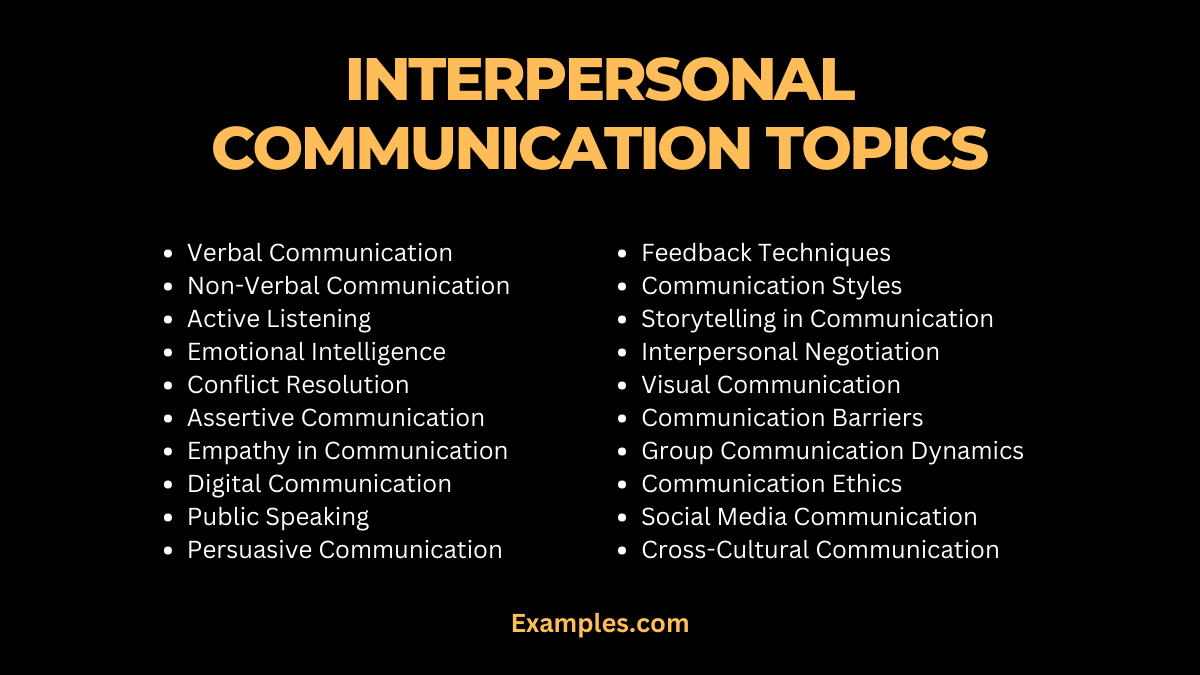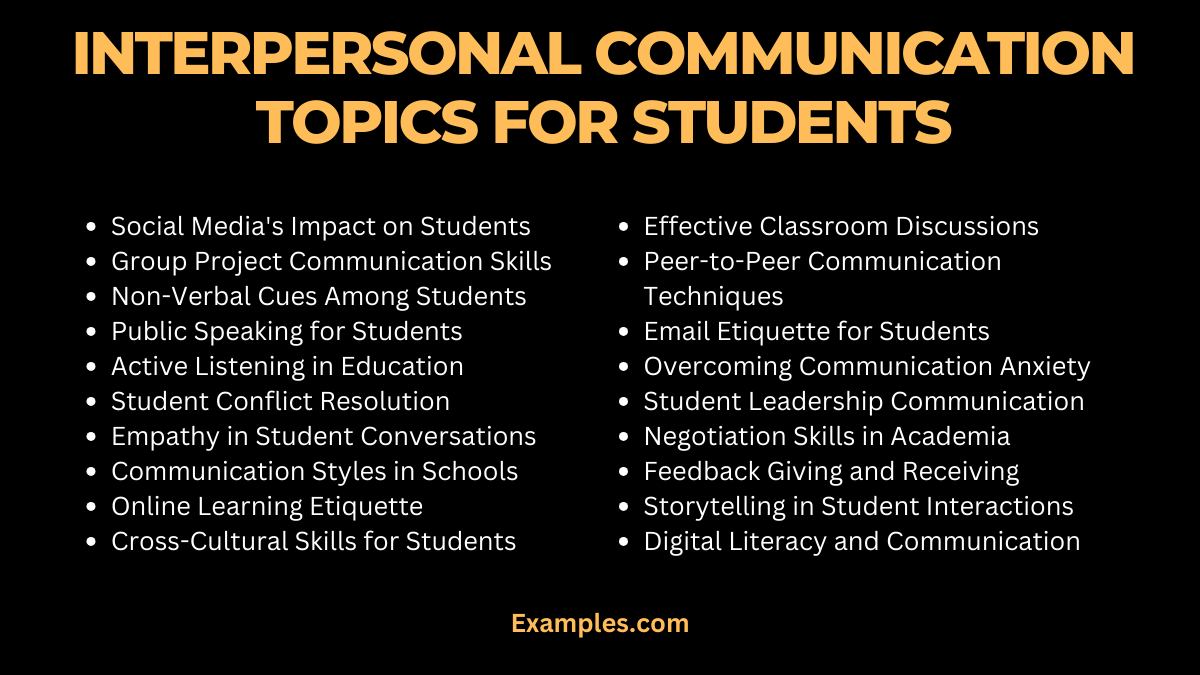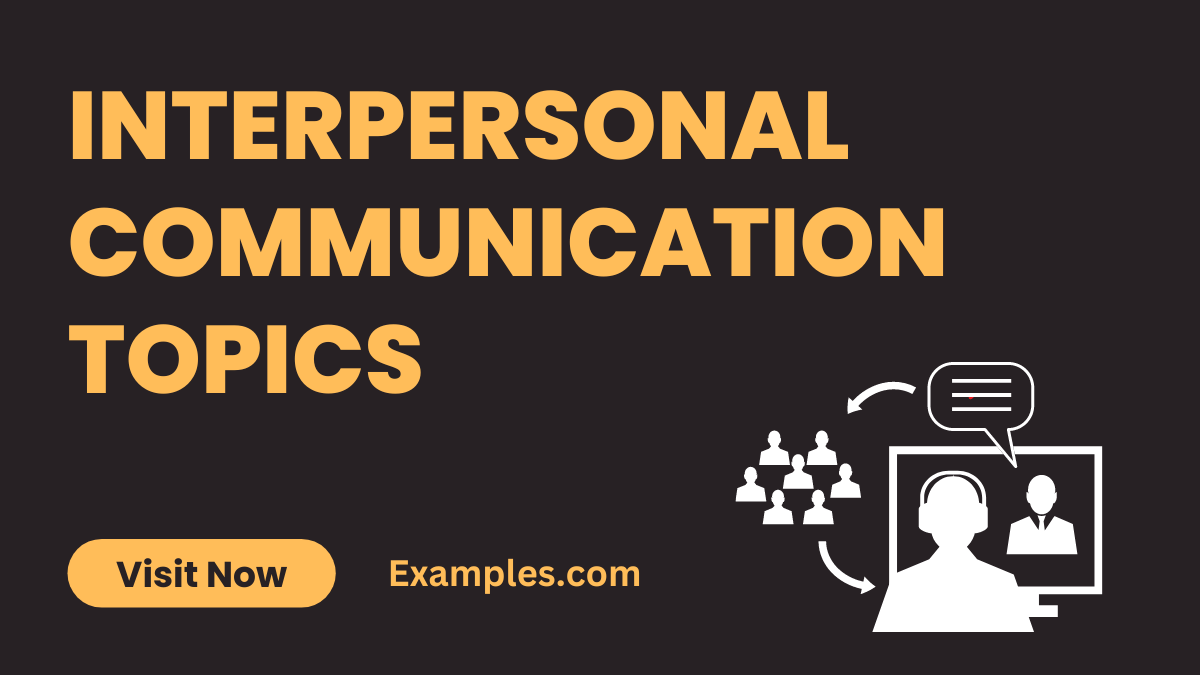20 Interpersonal Communication Topics Examples
Dive into the fascinating world of interpersonal communication topics with our complete guide, rich with practical examples. From mastering verbal communication to decoding the subtleties of non-verbal cues, this guide covers it all. Discover how to navigate various forms of interaction, including digital communication, and learn the principles that make interpersonal communication effective and meaningful. Whether for personal growth or professional development, understanding these topics can significantly enhance your ability to connect with others. Engage with our guide and elevate your communication skills using real-world communication examples.
20 Interpersonal Communication Topics

Embark on a journey through the diverse landscape of interpersonal communication topics. This comprehensive exploration covers everything from verbal nuances to digital interaction strategies. Each topic is a gateway to enhancing your communication skills, vital for both personal connections and professional success. Delve into these topics to unlock the secrets of effective, meaningful interactions in a variety of contexts.
- Verbal Communication: Understanding the power of words in conveying messages.
Example: “I choose my words carefully to express my thoughts clearly and respectfully.” - Non-Verbal Communication: Interpreting body language, facial expressions, and gestures.
Example: “By observing non-verbal cues, I can better understand unspoken feelings.” - Active Listening: Engaging fully and attentively in conversations.
Example: “I show I’m listening by nodding and summarizing what’s been said.” - Emotional Intelligence: Recognizing and managing emotions in communication.
Example: “I acknowledge my emotions and those of others to communicate more empathetically.” - Conflict Resolution: Navigating disagreements with understanding and tact.
Example: “I approach conflicts seeking common ground and mutual understanding.” - Assertive Communication: Expressing oneself confidently and respectfully.
Example: “I state my needs clearly without undermining others’ viewpoints.” - Empathy in Communication: Showing understanding and compassion in interactions.
Example: “I express empathy by acknowledging and responding to others’ feelings.” - Digital Communication: Effectively communicating through digital platforms.
Example: “I ensure my emails are clear, concise, and considerate.”

- Public Speaking: Conveying messages effectively to larger audiences.
Example: “I engage my audience with clear, relatable, and well-structured presentations.” - Persuasive Communication: Influencing others through compelling arguments.
Example: “I present logical and emotionally appealing arguments to persuade.” - Cross-Cultural Communication: Navigating communication across different cultures.
Example: “I am mindful of cultural differences and adapt my communication style accordingly.” - Feedback Techniques: Providing constructive and positive feedback.
Example: “I offer feedback that is specific, helpful, and encouraging.” - Communication Styles: Identifying and adapting to different communication preferences.
Example: “I adjust my communication style to match the preferences of my audience.” - Storytelling in Communication: Using narratives to engage and connect.
Example: “I incorporate storytelling to make my messages more relatable and memorable.” - Interpersonal Negotiation: Skillfully negotiating in personal and professional settings.
Example: “I negotiate by focusing on win-win outcomes and mutual benefits.” - Visual Communication: Utilizing visual aids to enhance understanding.
Example: “I use visuals like graphs and charts to clarify complex points.” - Communication Barriers: Identifying and overcoming obstacles in communication.
Example: “I work to recognize and address language, emotional, or cultural barriers.” - Group Communication Dynamics: Facilitating effective communication in group settings.
Example: “I encourage open and inclusive communication in team discussions.” - Communication Ethics: Upholding integrity and respect in all interactions.
Example: “I adhere to ethical principles by being honest and respectful.”

- Social Media Communication: Navigating the nuances of communicating on social platforms.
Example: “I communicate thoughtfully and responsibly on social media platforms.”
Interpersonal Communication Topics for Students

- The Impact of Social Media on Teen Communication: Examining how platforms like Instagram and Snapchat reshape teen interaction and self-expression. Social media profoundly influences teenage communication, often shaping their social interactions and self-image.
- Effective Communication Skills in Group Projects: Strategies for clear, collaborative communication among student groups. Teamwork in academic settings hinges on effective communication, necessitating skills in collaboration and conflict resolution.
- Understanding Non-Verbal Cues among Peers: Learning to interpret body language and facial expressions in peer interactions. Non-verbal communication plays a crucial role in understanding peers, especially in multicultural educational environments.
- Developing Public Speaking Skills: Techniques for building confidence and clarity in public speaking situations. Public speaking is a vital skill, beneficial for presentations and future professional scenarios.
- Active Listening in Academic Settings: The importance of listening actively for improved learning and interpersonal relationships. Active listening not only enhances learning but also fosters better relationships with classmates and educators.
- Navigating Interpersonal Conflicts in School: Approaches to manage and resolve conflicts with peers constructively. Conflict resolution is key to maintaining harmonious relationships and a positive school environment.
- The Role of Empathy in Student Interactions: Cultivating empathy to understand and connect with diverse classmates. Empathy is essential for fostering an inclusive and supportive educational community.
- Communication Styles and Their Impact: Understanding different communication styles and their effects on peer interactions. Recognizing diverse communication styles aids in better understanding and cooperation among students.
- Digital Etiquette in Online Learning: Best practices for communicating respectfully and effectively in online educational platforms. With the rise of online education, digital etiquette becomes increasingly important for student interactions.
- Cross-Cultural Communication Skills: Learning to communicate effectively with peers from diverse cultural backgrounds. Cultural awareness and sensitivity are crucial in today’s globalized educational settings.
Interpersonal Communication Topics for Research Paper

- The Evolution of Communication in the Digital Age: Analyzing how digital platforms have transformed human interaction. This topic explores the significant shift in communication patterns due to digital technologies.
- Impact of Emotional Intelligence on Leadership Communication: Examining the role of emotional intelligence in effective leadership communication. Emotional intelligence is a key factor in the effectiveness of leadership communication styles.
- Non-Verbal Communication in Different Cultures: Comparative study of non-verbal communication cues across various cultures. Cultural differences in non-verbal communication offer insightful perspectives on global interactions.
- The Psychology of Persuasion in Advertising: Investigating the techniques and psychological principles behind persuasive advertising. Understanding persuasion in advertising involves delving into consumer psychology and communication strategies.
- Barriers to Effective Communication in Healthcare: Identifying and addressing communication barriers between healthcare providers and patients. Effective communication is vital in healthcare settings, impacting patient outcomes and satisfaction.
- The Role of Listening in Conflict Resolution: Analyzing the importance of active listening in resolving interpersonal conflicts. Listening is a critical component in conflict resolution, often overlooked in communication studies.
- Gender Differences in Communication Styles: Exploring how communication styles differ between genders and their societal implications. This topic provides insights into gender-specific communication patterns and their impact on social dynamics.
- The Influence of Technology on Teen Communication Skills: Assessing how technology usage affects the communication abilities of adolescents. The pervasive use of technology among teens has significant implications for their communication skills development.
- Cultural Impact on Business Communication: Examining how cultural factors influence communication in international business settings. Understanding cultural nuances is crucial for effective communication in global business environments.
- Ethical Considerations in Mass Communication: Investigating the ethical dilemmas and responsibilities in mass media communication. This topic addresses the moral aspects and responsibilities inherent in mass media communication.
This comprehensive guide on Interpersonal Communication Topics offers insightful perspectives for students and researchers alike. It provides valuable, Interpersonal Communication in College-optimized insights into various interpersonal communication aspects, from student interactions to complex research subjects. These well-curated topics and tips not only enhance understanding but also equip readers with practical skills for effective communication in diverse settings.



